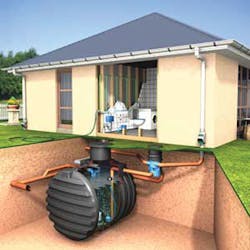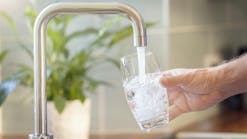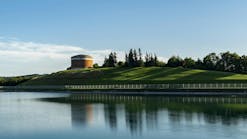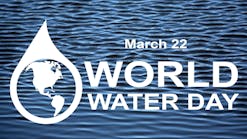The Lakeview water treatment plant will be the largest drinking water plant in North America using ultrafiltration membrane technology.
Rainwater harvesting is best designed-in to new-build structures, due to the need to install separate potable and non-potable water supplies. It is probably for this reason that the current UK debate has centred on other water-saving measures that can have an immediate impact. Even in the short term, however, rainwater harvesting can play a useful role by supplying water for garden/grounds irrigation, free of the constraints of hose-pipe bans, and without any need to alter the pipework within existing structures.
In the medium-term, as new buildings are developed, serious national policy consideration must be given to following the German example where the rainwater harvesting market is 300 times that of the UK. At this level, rainwater harvesting plays an important strategic role in the overall German approach to water management – a position brought about by a combination of supply issues, water pricing, and building regulations.
Given a mature market of this size, rainwater harvesting is a mainstream consideration in all new buildings – taken into account by designers and specifiers in exactly the same way as any other utility. The market is also well served in terms of choices, suppliers, installers, and service-providers.
What the UK market currently lacks in size, it aims to make up for in quality. Leading UK based component and system suppliers have already come together in the UK Rainwater Harvesting Association (www.ukrha.org) to make consumer access to this highly-effective, environment-friendly technology straightforward. Members also work to a code of practice designed to reassure end users.
With Parliament due to review national water management policy later this year, rainwater harvesting still scarcely rates a mention even in the preparatory report of the House of Lords Science & Technology Committee. If nationally we continue in the same vein, we will all be denied the benefits of a major auxiliary water supply that has long been enjoyed by our continental cousins.
So now, the secret is out! Modern rainwater harvesting is a reliable and cost-effective supplement to existing national water supplies with which, incidentally, it in no way interferes. It makes possible new developments where water supplies are already operating close to their limit, in the process bringing secondary environmental benefits by avoiding the wasted purification of water destined for non-potable purposes.
The UK has a great deal to learn from the German experience; let us all hope that national policy-makers and influencers take the opportunity to learn. The future integrity of our water supplies partially depends upon it!
Author’s Note
Lutz Johnen is a founder member of the UK Rainwater Harvesting Association and Managing Director of Aquality Trading & Consulting Ltd., based in London.



